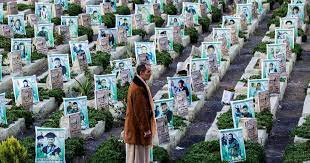
DUBAI, Dec 24, 2023 (BSS/AFP) - Yemen's warring parties have committed to a new ceasefire and agreed to engage in a UN-led peace process to end the war, the UN envoy for Yemen said Saturday.
The announcement by UN special envoy for Yemen, Hans Grundberg, marks the latest step to end the nine-year war that has killed hundreds of thousands of people and triggered one of the world's worst humanitarian crises.
It follows recent meetings by Grundberg in Saudi Arabia and Oman with Rashad Al-Alimi, head of Yemen's Saudi-backed presidential council and Mohammed Abdul Salam, the chief negotiator of the Iran-backed Huthi rebels.
Grundberg said he "welcomes the parties' commitment to a set of measures to implement a nation-wide ceasefire... and (to) engage in preparations for the resumption of an inclusive political process", according to a statement by his office.
The envoy "will now engage with the parties to establish a road map under UN auspices that includes these commitments and supports their implementation", the statement added.
Yemen has been gripped by conflict since the Iran-backed Huthi rebels took control of the capital Sanaa in 2014, triggering a Saudi-led military intervention in support of the beleaguered government the following year.
A UN-brokered ceasefire that took effect in April 2022 brought a sharp reduction in hostilities. The truce expired in October last year, though fighting largely remains on hold.
Grundberg will now "engage with the parties to establish a roadmap under UN auspices" to end the war.
The road map also includes commitments to pay civil servants' salaries, open routes into the rebel-blockaded city of Taez and other parts of Yemen and resume oil exports, according to the statement.
"Yemenis are watching and waiting for this new opportunity to provide for tangible results and progress towards lasting peace," Grundberg said.
"The parties have taken a significant step. Their commitments are, first and foremost, an obligation to the Yemeni people."
- Red Sea attacks -
The agreement comes amid a flurry of attacks by the Huthi rebels on key shipping lanes in the Red Sea in solidarity with Palestinians in the Gaza Strip, where Israel is fighting Hamas militants.
The Huthis have pledged to attack Israel-linked vessels or ships heading to Israeli ports unless an end is brought to the Israel-Hamas war that started on October 7.
They have launched more than 100 drone and missile attacks, targeting 10 merchant vessels involving more than 35 different countries, according to the Pentagon.
The attacks by the rebels are imperilling a transit route that carries up to 12 percent of global trade, prompting the United States to set up a multinational naval task force to protect Red Sea shipping.
The Huthi "military actions hinder progress towards a peaceful resolution", Mohammed Albasha, a senior Middle East analyst for the US-based Navanti Group, told AFP.
"The Huthis have transitioned... to becoming aggressors targeting civilian assets," he said.
The latest agreement also coincides with a push by Saudi Arabia to extricate itself from the conflict, despite slim hopes of a lasting peace.
The oil-rich monarchy gave a signal this year by resuming ties with Iran, which backs the Huthis against the Saudi-supported government in a proxy war.
The Saudi-led intervention's stated aim was to protect civilians from Huthi attacks, restore the government and stop Yemen becoming a safe haven for Iranian-backed forces.
Eight years in, the rebels control swathes of the country and command an impressive arsenal of weapons that they have used to attack Saudi Arabia and the United Arab Emirates, another coalition member.
Many analysts are pessimistic that Riyadh's plans for a downsized military role will bring peace to Yemen, which remains deeply fractured along religious, regional and political lines.